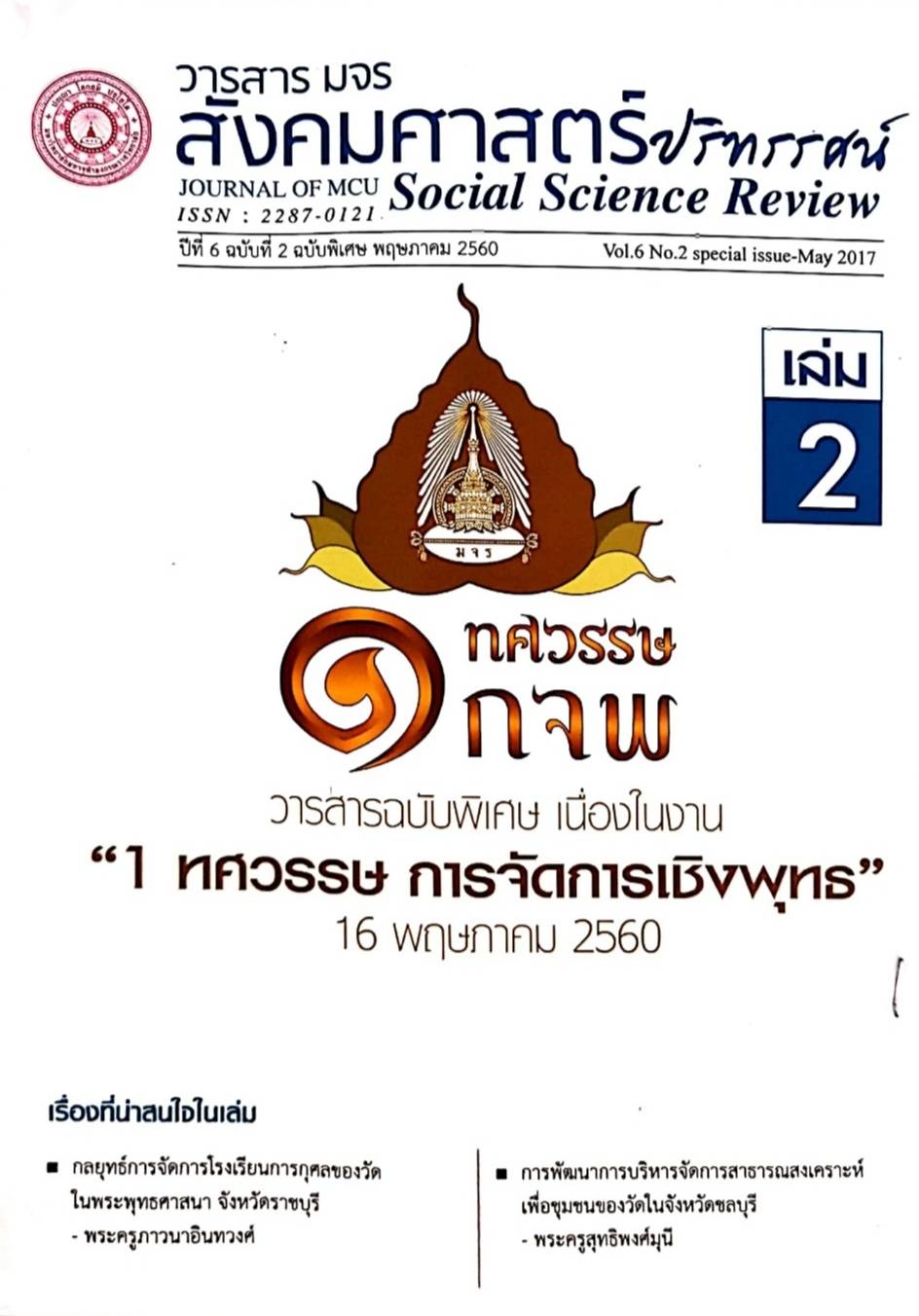การเสนอรูปแบบการพัฒนาภาวะผู้นาผู้บริหารระดับกลางโรงเรียนเอกชน สังกัดสานักงานเขตพื้นที่การศึกษา เขต 1 จังหวัดอุดรธานี
คำสำคัญ:
ภาวะผู้นา , ผู้บริหารระดับกลางบทคัดย่อ
การวิจัยครั้งนี้มีวัตถุประสงค์เพื่อนาเสนอรูปแบบการพัฒนาภาวะผู้นาผู้บริหารระดับกลางสังกัดสานักงานคณะกรรมการการศึกษาขั้นพื้นฐาน โดยผู้วิจัยได้ใช้วิธีการวิจัยแบบผสม ซึ่งมีขั้นตอนในการดาเนินการวิจัยแบ่งออกเป็น 4 ระยะ ดังนี้ ระยะที่ 1 การวิเคราะห์องค์ประกอบภาวะผู้นำผู้บริหารระดับกลางเชิงทฤษฎี โดยการศึกษาเอกสาร ตำรา แนวคิด ทฤษฎี งานวิจัยที่เกี่ยวข้อง และใช้เทคนิคการสัมภาษณ์แบบมีโครงสร้าง สัมภาษณ์ผู้ทรงคุณวุฒิ 5 คน ระยะที่ 2 การประเมินความเหมาะสมและยืนยันองค์ประกอบภาวะผู้นาผู้บริหารระดับกลาง โดยใช้เทคนิคเดลฟายกับผู้เชี่ยวชาญ 24 คน ระยะที่ 3 การวิเคราะห์องค์ประกอบภาวะผู้นาและสร้างรูปแบบการพัฒนาภาวะผู้นาผู้บริหารระดับกลาง โดยใช้เทคนิคการวิเคราะห์องค์ประกอบเชิงสำรวจ และนาผลการวิเคราะห์องค์ประกอบที่ได้มาวิเคราะห์ร่วมกับวิธีการและเทคนิคการพัฒนาภาวะผู้นาที่สังเคราะห์ไว้สร้างรูปแบบการพัฒนาภาวะผู้นาผู้บริหารระดับกลาง ระยะที่ 4 การตรวจสอบความเป็นไปได้ในการนาไปปฏิบัติจริงของรูปแบบการพัฒนาภาวะผู้นาผู้บริหารระดับกลาง โดยใช้เทคนิคการประชุมผู้เชี่ยวชาญ และการสอบถามความคิดเห็นของผู้บริหารระดับกลาง สังกัดสานักงานคณะกรรมการการศึกษาขั้นพื้นฐานผลการวิจัยสรุปได้ ดังนี้1. ภาวะผู้นาผู้บริหารระดับกลางประกอบด้วยองค์ประกอบหลัก 3 องค์ประกอบ ดังนี้1.1 องค์ประกอบภาวะผู้นาผู้บริหารระดับกลาง เชิงคุณลักษณะ จะประกอบด้วยองค์ประกอบย่อย 8 ด้าน คือ 1) ความสามารถในการปรับตัว 2) การมีวิสัยทัศน์ 3) การมีความมั่นใจ ในตนเอง 4) มีทักษะในการสื่อสาร5) ให้ความสำคัญกับทรัพยากรมนุษย์ 6) มีความน่าเชื่อถือ 7) มีมนุษยสัมพันธ์ และ 8) การมีวุฒิภาวะ1.2 องค์ประกอบภาวะผู้นาผู้บริหารระดับกลาง เชิงพฤติกรรม จะประกอบด้วย องค์ประกอบย่อย 5 ด้าน คือ 1) ความเป็นผู้นำที่มุ่งคนและมุ่งงาน 2) ความเป็นผู้นำแบบประชาธิปไตย 3) ความเป็นผู้นาแบบประนีประนอม 4) ความเป็นผู้นาแบบที่ปรึกษา และ 5) ความเป็นผู้นำการเปลี่ยนแปลง1.3 องค์ประกอบภาวะผู้นำผู้บริหารระดับกลาง เชิงบทบาท จะประกอบด้วยองค์ประกอบย่อย 4 ด้าน คือ 1) บทบาทตามตำแหน่ง 2) บทบาทนักสื่อสาร 3)บทบาทในการติดตามและประสานงาน และ 4) บทบาทนักพัฒนา2. “ภาวะผู้นำผู้บริหารระดับกลางโรงเรียนเอกชน สังกัดสานักงาน เขตพื้นที่การศึกษาเขต 1 จังหวัดอุดรธานี” จากการนาเทคนิคการสนทนากลุ่ม (Focus Group Discussion )ภาวะผู้นาผู้บริหารระดับกลาง สังกัดสานักงานคณะกรรมการการศึกษาขั้นพื้นฐาน ประกอบด้วยองค์ประกอบหลักที่สำคัญ 3 องค์ประกอบ คือ องค์ประกอบภาวะผู้นาผู้บริหารระดับกลางเชิงคุณลักษณะ องค์ประกอบภาวะผู้นาผู้บริหารระดับกลางเชิงพฤติกรรม และ องค์ประกอบภาวะผู้นำผู้บริหารระดับกลางเชิงบทบาท จากการสนทนากลุ่มด้านภาวะภาวะผู้นาผู้บริหารระดับกลางโรงเรียนเอกชน สังกัดสานักงาน เขตพื้นที่การศึกษา เขต 1 จังหวัดอุดรธานีทั้ง 3 องค์ประกอบหลักมีความเหมาะสมโดยไม่มีประเด็นข้อควรปรับปรุง
เอกสารอ้างอิง
กัลยา เมืองสง. (2550). รูปแบบการพัฒนาภาวะผู้นาเชิงกลยุทธ์ของผู้บริหารสถานศึกษาขั้นพื้นฐาน. วิทยานิพนธ์ปริญญาการศึกษาดุษฎีบัณฑิต สาขาวิชาการบริหารการศึกษามหาวิทยาลัยบูรพา.
จามจุรี จาลองเมือง. (2548). รูปแบบภาวะผู้นาที่มีประสิทธิผลของผู้บริหารโรงเรียนในสังกัดกรุงเทพมหานคร. วิทยานิพนธ์ปริญญาการศึกษาดุษฎีบัณฑิต สาขาวิชาการบริหารการศึกษา. มหาวิทยาลัยบูรพา.
ดนัย เทียนพุฒ. (2545). การบริหารทรัพยากรบุคคลสู่ศตวรรษที่ 21. กรุงเทพฯ:จุฬาลงกรณ์มหาวิทยาลัย.
Alasmari,A.A. (2002). Administrative behaviors of effective educational leaders as perceived by leader of Saudi Arabian coast guard training institutions.
Retrieved June 4, 2008, from http://www.lib.umi.com/ dissertations/fullcit/3078815.
Bennis, W.G., & Nanus, B.(2003). Leader: Strategies for taking charge. New York:Happer Collins.
Bolinger, B.S. (2001). Humor and leadership : A gender based investigation of the correlation between the attribute of humor and effective leadership.
Retrieved June 4, 2008, from http:// www.lib.umi.com /dissertations /fullcit/3001184.
DuBrin, A.J. (2004). Leadership research finding, practice, and skills. Boston: Houghton Mifflin.
Kotter, J. P. (1988). The leadership Factor . New York: Free Press.
ดาวน์โหลด
เผยแพร่แล้ว
รูปแบบการอ้างอิง
ฉบับ
ประเภทบทความ
สัญญาอนุญาต
ลิขสิทธิ์ (c) 2020 วารสาร มจร สังคมศาสตร์ปริทรรศน์

อนุญาตภายใต้เงื่อนไข Creative Commons Attribution-NonCommercial-NoDerivatives 4.0 International License.
เพื่อให้เป็นไปตามกฎหมายลิขสิทธิ์ ผู้นิพนธ์ทุกท่านต้องลงลายมือชื่อในแบบฟอร์มใบมอบลิขสิทธิ์บทความให้แก่วารสารฯ พร้อมกับบทความต้นฉบับที่ได้แก้ไขครั้งสุดท้าย นอกจากนี้ ผู้นิพนธ์ทุกท่านต้องยืนยันว่าบทความต้นฉบับที่ส่งมาตีพิมพ์นั้น ได้ส่งมาตีพิมพ์เฉพาะในวารสาร มจร สังคมศาสตร์ปริทรรศน์ เพียงแห่งเดียวเท่านั้น หากมีการใช้ภาพหรือตารางหรือเนื้อหาอื่นๆ ของผู้นิพนธ์อื่นที่ปรากฏในสิ่งตีพิมพ์อื่นมาแล้ว ผู้นิพนธ์ต้องขออนุญาตเจ้าของลิขสิทธิ์ก่อน พร้อมทั้งแสดงหนังสือที่ได้รับการยินยอมต่อบรรณาธิการ ก่อนที่บทความจะได้รับการตีพิมพ์ หากไม่เป็นไปตามข้อกำหนดเบื้องต้น ทางวารสารจะถอดบทความของท่านออกโดยไม่มีข้อยกเว้นใดๆ ทั้งสิ้น





